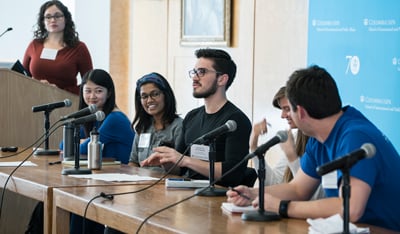2016 Graduate Education
THIS GUIDE IS NO LONGER ACTIVE. For the current FP Guide, click here.
Columbia University, School of International and Public Affairs (SIPA)
“Solutions to policy challenges today and in the future will require international and interdisciplinary perspectives, as well as collaboration between the public and private sectors,” says Merit E. Janow, dean of Columbia University’s School of International and Public Affairs (SIPA). “As a leading global policy school, we believe a global perspective is essential to training students from around the world to be effective leaders and problem solvers.”

Columbia University, School of International and Public Affairs (SIPA)
Columbia SIPA places a strong emphasis on rigorous academic analysis and learning in combination with practical skills and applied knowledge. The school’s primary master’s degree programs culminate in required workshops that give small teams of students the opportunity to solve real-world problems for clients that range from multilateral financial institutions to city governments and NGOs around the world.
“We prepare students for careers of the coming century—careers in which they will move between countries and between sectors,” says Janow.
Students benefit from the school’s unique blend of scholars and practitioners. SIPA’s faculty are well known for their research on pressing global issues, such as the impact of climate change, shifting priorities of U.S. foreign policy, the economics and geopolitics of energy, and the challenges facing international financial institutions.
“SIPA is the interdisciplinary hub of global-policy teaching, research, and engagement at Columbia,” says Janow. “We regularly work across disciplines and schools—including Columbia’s law, business, and engineering schools—to engage an extremely vibrant community of students, scholars, and practitioners.”
SIPA’s Master of International Affairs (MIA) program is designed to provide students with qualitative and quantitative analytical skills needed to understand complex transnational issues and manage real-world organizations. In addition to pursuing a policy concentration and demonstrating proficiency in a language other than English, students complete an internship and a Capstone workshop, gaining hands-on experience with diverse organizations in the public, private, and nonprofit sectors.
The Master of Public Administration (MPA) program offers a similar curriculum that emphasizes the application of analytic tools to real-world issues.
Three specialized MPA programs are further tailored to specific policy challenges:
- The MPA in Development Practice (MPA-DP) trains current and aspiring practitioners to develop, implement, and manage comprehensive approaches to sustainable development in locales around the world.
- The MPA Program in Economic Policy Management (PEPM) provides mid-career professionals and policymakers with skills to understand, design, and implement economic policy in market economies.
- The MPA in Environmental Science and Policy (MPA-ESP) is an immersive, one-year program that prepares students to become sustainability professionals in government, business, and civil society.
SIPA’s Executive MPA (EMPA) program gives ambitious executives the chance to pursue a rigorous MPA curriculum through part-time study, while the Global Executive MPA (Global EMPA) offers students in U.S. and selected international locations a hybrid learning model that combines online and face-to-face instruction.
Contents
- 2016 Graduate Education
- Association of Professional Schools of International Affairs (APSIA)
- Boston University, Frederick S. Pardee School of Global Studies
- Central European University (CEU), School of Public Policy (SPP)
- Columbia University, School of International and Public Affairs (SIPA)
- The Fletcher School of Law and Diplomacy at Tufts University
- Georgetown University, Walsh School of Foreign Service (SFS)
- Indiana University, School of Global and International Studies
- Johns Hopkins University, School of Advanced International Studies (SAIS)
- Seton Hall University, School of Diplomacy and International Relations
- University of Kent, Brussels School of International Studies (BSIS)
- University of Minnesota, Humphrey School of Public Affairs
- The University of Texas at Austin, Lyndon B. Johnson School of Public Affairs
- University of Washington, Jackson School of International Studies